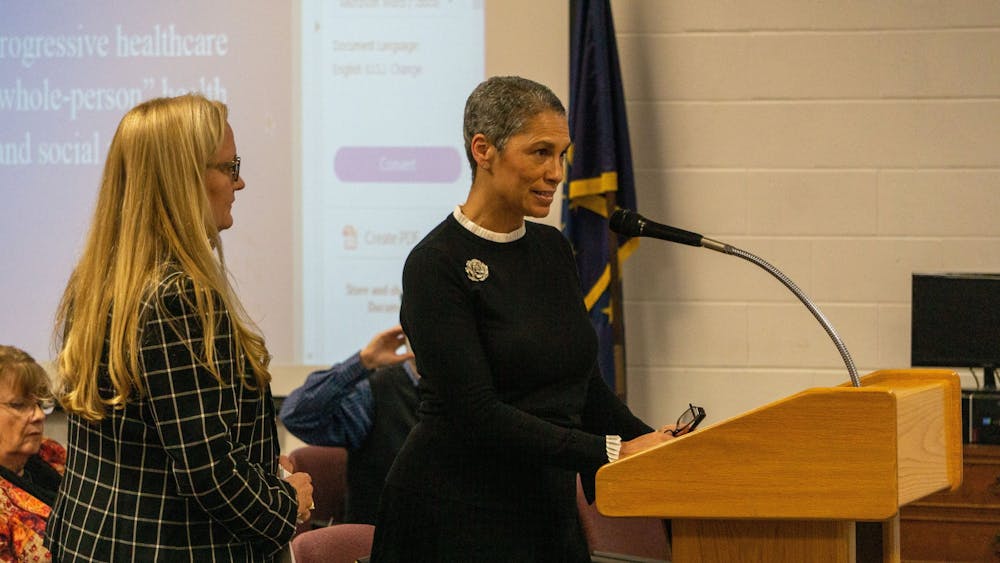Editor's Note: This story is part of The Partnership Project, a series of content written in an effort by The Daily News to follow the formal collaboration of Ball State University and Muncie Community Schools. Read more in this series here.
By April, Southside Middle School might have a Meridian Health Services clinic within its building.
Representatives from Meridian Health Center presented their proposal to have a school-based health center at Southside during Tuesday’s Muncie Community Schools (MCS) board meeting.
Pending application to and approval of the Health Resources and Services Administration (HRSA), Meridian would be allowed to open a school-based health center at Southside, said Tracy Douglas-Wheeler, vice president of community health at Meridian.
Following the approval, it is required by HRSA to have the clinic up and running at the same location within 20 days, Douglas-Wheeler said.
The new clinic would be a federally qualified health center (FQHC) and open to the school’s students, faculty and staff and the public, she said.
While Meridian already works with MCS by providing them with behavioral clinicians, the new health center would allow for mental health services to be provided in the school, she said.
HRSA’s website, defines FQHCs as “community-based health care providers that receive funds from the HRSA Health Center Program to provide primary care services in underserved areas.”
“An FQHC exists really around ensuring that individuals in a community have access to good healthcare no matter what their ability to pay is,” Douglas-Wheeler said. “Even though we’re an FQHC, we will see patients whether they have insurance or not.”
If patients don’t have insurance, she said Meridian has insurance navigators if there is a way it can work with the family to help explore some insurance options. If not, she said it is required for Meridian to provide services on a sliding discount.
Douglas-Wheeler said Indiana has 48 school-based FQHCs, and more schools are looking to have on-site health services. She added about 51 percent of school-based health centers in the United States are FQHCs.
Lisa Suttle, Meridian’s regional vice president of clinical services, said this is a pilot program, following which Meridian plans to open health centers in other schools.
The decision to pick Southside as the school for the new health center was made after looking at Indiana University Health Ball Memorial Hospital’s 2018 Community Health Needs Assessment, Suttle said.
Substance use or abuse, obesity, poverty and chronic diseases like diabetes, cancer and heart disease were the top four community needs listed in the assessment, which covered the hospital’s community in Delaware, Jay and Randolph counties.
Suttle added behavioral health-related issues like depression and anxiety were also rated high. The assessment states need for a central resource to refer residents with mental health, behavioral health and addiction needs was identified as a significant need in Delaware County.
“When we were looking at it, we can touch several of those but also touch the prevention and education for this younger population,” she said.
Suicide prevention, Suttle said, is another concern Meridian has with respect to Delaware County.
“[That’s] definitely something we want to help with not on the reactive side but more on the proactive side — what can we do, how can we help, how do we know, what can we educate teachers about, where can we be about in the process of really providing that intense therapy that needs to occur,” she said.
Douglas-Wheeler added Delaware County has a high infant mortality rate — 8.4 percent, according to the assessment, higher than the statewide rate of 7.2 percent — something Meridian also intends on addressing at the school level.
“There’s enough research out there to show that when these kids are healthy and we’re addressing that whole-person care, that they are seeing their successes increase in the classroom,” she said.
Meridian is already conducting interviews for a nurse practitioner and a licensed clinical social worker to be present at the new health center, she said, adding MCS will be involved in the process of selecting the health center’s staff.
During their presentation, the two representatives highlighted the primary care services that would be offered in collaboration with the school's nurses and behavioral health services in partnership with the school's staff.
The presentation also listed health education and promotional activities that could be offered by working closely with MCS.
Craig Standish, Southside principal, said it was easy to accommodate the partnership at the school with Meridian Health Services.
Having immediate access to the health center, Standish said, would be a huge benefit to the students and their parents, as it saves them time needed to resolve health-related issues.
“I’m excited to pilot it,” he said. “It raises the level of care that our students have access to.”
Contact Rohith Rao with comments at rprao@bsu.edu or on Twitter @RaoReports.





